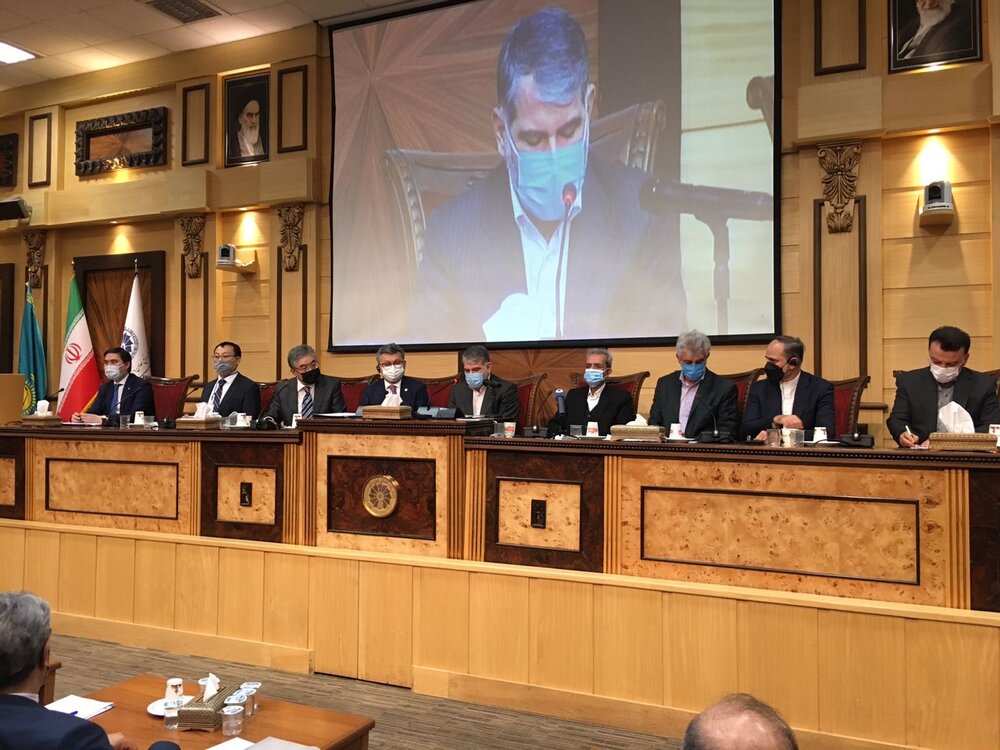ICCIMA hosts Iran-Kazakhstan business forum

TEHRAN – Iran Chamber of Commerce, Industries, Mines and Agriculture (ICCIMA) hosted an Iran-Kazakhstan business forum on Monday prior to the two countries’ 17th Joint Economic Committee meeting which was also held during February 21-22 in Tehran.
The forum was attended by senior officials from the two countries, including Iranian Agriculture Minister Javad Sadati-Nejad, Kazakhstan’s Minister of Trade and Integration Bakhyt Sultanov, Kazakhstan's Ambassador to Tehran Askhat Orazbay, ICCIMA Head Gholam-Hossein Shafeie, and ICCIMA Deputy Head Mohammadreza Karbasi as well as Iranian ambassador to Astana Majiad Samadzadeh Saber.
Speaking in this gathering, ICCIMA Head Shafeie underlined Iran and Kazakhstan’s deep cultural and historical roots and noted that despite the great political relations between the two countries the level of trade is unsatisfactory.
He noted that having economic relations with the neighboring countries is a priority of the government and private sector in Iran and Kazakhstan as one of the biggest countries in central Asia has a significant place among Iran’s trade partners.
Shafeie further mentioned the fact that despite all the restrictions during the COVID-19 pandemic, Iran and Kazakhstan's borders were never closed on each other, and trade relations between the two countries were ongoing at all times.
Pointing to the great potentials and capacities of the two countries for mutual cooperation, Shafeie said petrochemicals, oil, gas, mining, industry, agriculture, pharmaceuticals, as well as technical and engineering services all have the potential for mutual cooperation and investment between the two sides.
Elsewhere in his remarks, the official mentioned Kazakhstan’s membership to the Eurasian Economic Union (EAEU) and Shanghai Agreement, saying: “Kazakhstan’s position in such international treaties can be a good platform for Iran to expand its trade with the world.”
He further put the two countries’ trade level in 2020 at $235 million, saying that the Islamic Republic’s share of Kazakhstan’s total foreign trade in the mentioned year (which was $85 billion) is really insignificant.
The ICCIMA Head further mentioned some of the problems in the way of trade between the two countries including lack of appropriate banking relations, lack of enough direct flights between the two countries, problems regarding the issuance of visas for Iranian traders, lack of appropriate infrastructure in Iran’s northern ports as well as the need for issuing guarantees for the exporters of technical and engineering services, and noted that resolving these problems should become the priority of the two countries officials during the Joint Economic Committee meeting.
According to Shafeie establishing communication between the two countries' organizations and institutions will also help facilitate the trade relations between the two sides.
He also underlined the significance of the Bandar Abbas-Kazakhstan-Turkmenistan corridor and noted that this route can connect Kazakhstan to the Arab countries of the Persian Gulf and also to the East Asian countries.
He also pointed to the areas in which the two countries’ private sectors can cooperate, saying: “Industrial sector, tourism, biotechnology, mining, and joint investment in production units can be among the fields in which the two countries' private sectors can also work together.”
Shafeie also mentioned the capabilities of Iranian contractors in the field of technical and engineering services and said Iranian companies have previously worked on several projects in various areas including roads, highways, construction, etc. in Kazakhstan.
Iran-Kazakhstan trade can reach $3b in 3 years
Elsewhere in the forum, Sadati-Nejad also expressed dissatisfaction with the current level of economic relations between the two countries and noted that the level of trade between Iran and Kazakhstan can reach $3 billion in the next three years.
“If we provide the groundwork for cooperation between the two sides, we can increase the level of mutual trade to $3 billion over a three-year period,” he stressed.
According to Sadati-Nejad, the two sides have discussed positive steps for long-term cooperation between the two countries, including an agreement to establish a joint trade council, holding a specialized exhibition of Iranian products in Kazakhstan in the coming months, a joint banking committee to implement using national currencies in trade, transport development and reducing tariffs as well as strengthening maritime transport.
Deals worth $5 billion already signed between Iran, Kazakhstan private sectors
Finally, Kazakhstan’s Minister of Trade and Integration Bakhyt Sultanov, for his part underlined the positive relations between the two sides and said Iranian and Kazakh companies signed deals worth over $5 billion in 2021.
He stressed the need for complete use of the logistic capacities of the two countries for increasing the level of economic exchanges between the two sides.
He considered the role of the logistics sector in the expansion of trade between the two countries very important and noted that the Iran-Turkmenistan-Kazakhstan corridor has a significant role in reducing trade costs.
“We are already negotiating with Turkmenistan to reduce transit tariffs and facilitate trilateral trade; They have agreed to implement the reduced tariffs scheme for three months and I hope it will continue,” Sultanov stated.
Iran-Kazakhstan ink 5 co-op documents
Later on Monday, the 17th Iran-Kazakhstan Joint Economic Committee meeting was held at Spinas Hotel in Tehran, during which the two sides signed five cooperation documents in various fields including standards, economic, scientific, technical, and cultural as well as customs.
The mentioned documents were signed by Iranian Agriculture Minister Javad Sadati-Nejad, and Kazakhstan’s Minister of Trade and Integration Bakhyt Sultanov who co-chaired the two countries’ 17th Joint Economic Committee meeting.
EF/MA
Leave a Comment